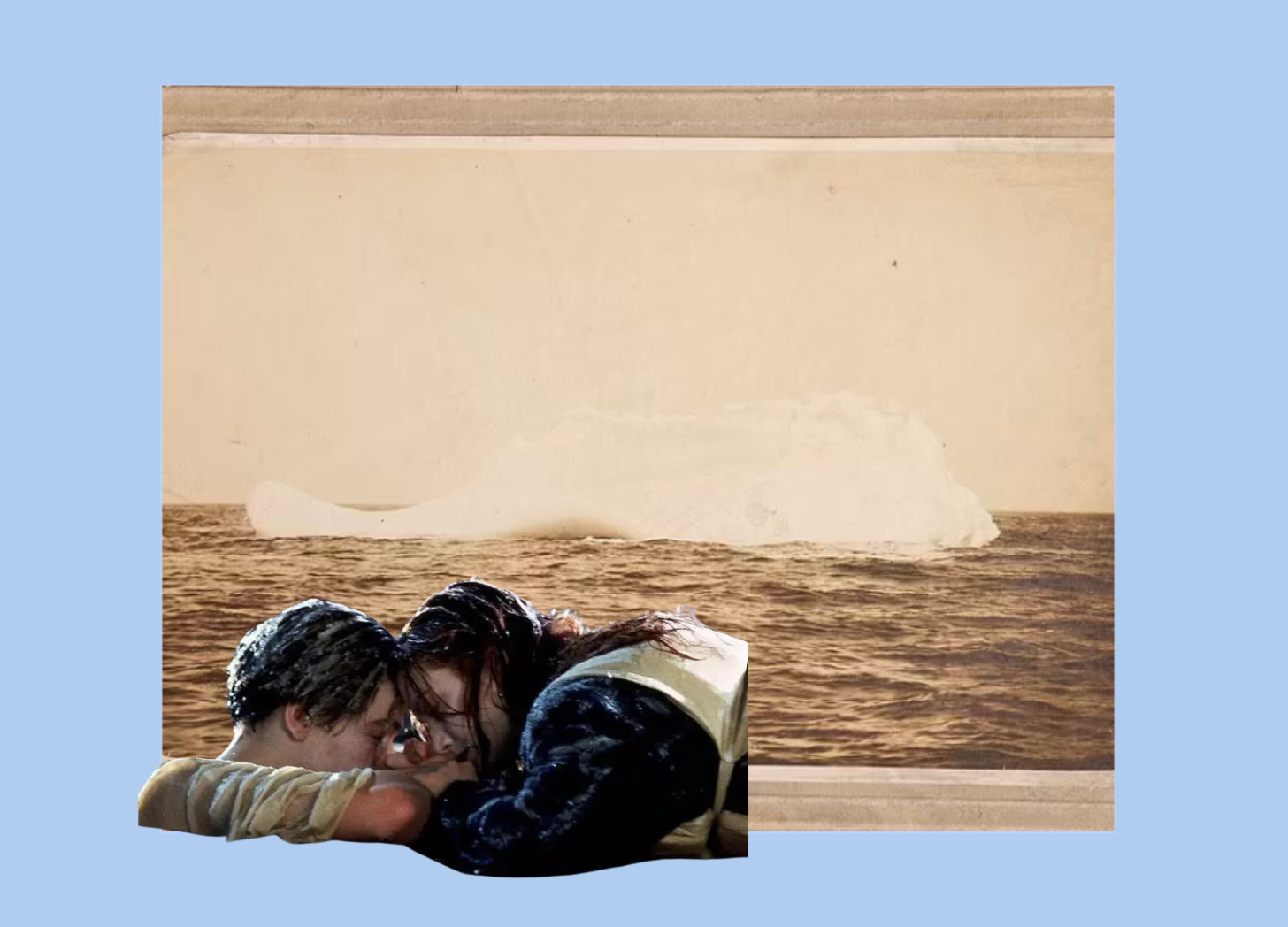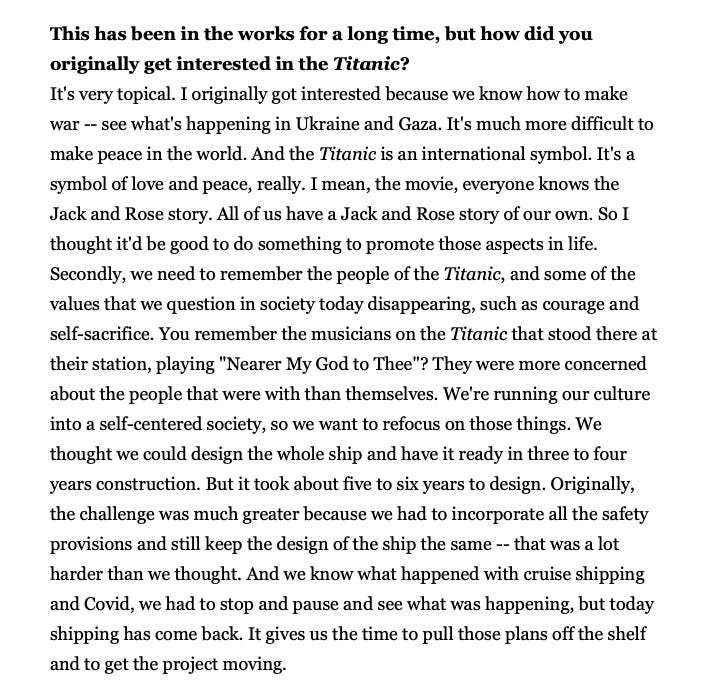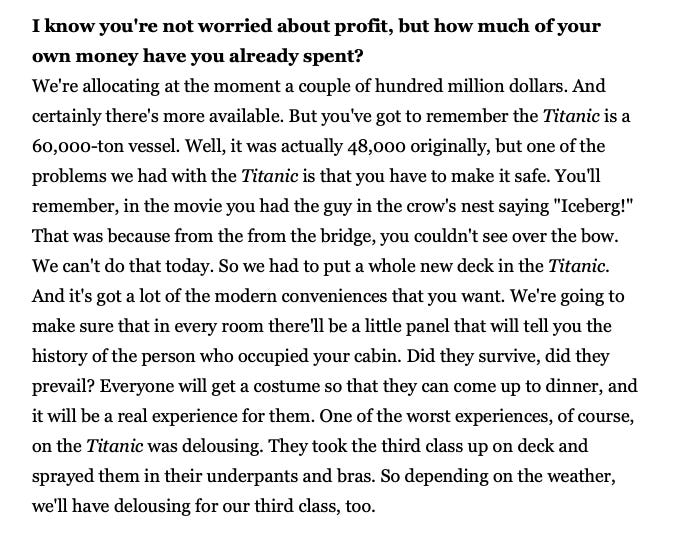We Are STILL down with this ship.
Why We’re Still Obsessed with the Titanic: A Deep Dive into Recent News and Collectibles
We are approaching the anniversary of the Titanic (it sank on April 14-15th, 1912), and every year I can’t get over the ways it still drives interest in the news and pop culture.
The Titanic may never have been my “Roman Empire,” but I have always been fascinated by the interest in it. Why do we read books about it, watch the movie, tour museum exhibits, and buy the merch?
In this week’s episode of Hello, Friend! I talk to my friend Emily, a maritime archivist, about the trajectory of collecting and commemorating the Titanic after its sinking in 1912. Stay tuned for that convo, which explores how conserving items salvaged from a wreck works, along with the legal decisions that defined what could be salvaged. You’ll also hear Emily’s account of visiting the Titanic museum near Dollywood (both of which are on my bucket list!).
In today’s newsletter, I wanted to get into the ways we can see the Titanic in our world today and the uses people are putting to the story (and commemoration) of the Titanic. I will be limiting my discussion to recent appearances of the Titanic in the news to demonstrate the many interests people have in the wreck and its history, and to marvel at the stories we continue to tell about it.
The most obvious area of Titanic coverage is the seemingly endless auctions of Titanic items. Recently, an auctioneer announced the sale of the leather case that held the violin of Titanic’s bandleader, Wallace Hartley, for example.
He led the eight-person band that played as passengers were loaded into lifeboats. Before entering the water, he strapped the bag (holding his violin) to himself, presumably for buoyancy. It feels chilling (pun not intended) to realize this bag was found with his body. The violin and bag were originally returned to his fiancée in Lancashire. It must have compounded her grief to have the gift she’d given him returned as a sad token of her loss. Years later, she gifted the violin to a student. Passing through several hands, it sold at auction for 1.1 million pounds (!). Now, the bag is for sale and is expected to fetch £100,000.
It’s one thing to say, baby, £100,000. . . in this economy? But I have to wonder what owning this item might do for a collector. What does standing in front of a historical object do for us? Does it connect us to this moment in the past? Does it make it real, as if a tangible object can transport us from an abstract account of an event on the page to the reality that these were real people in a real place experiencing this? I’m a historian who thinks about this stuff all the time, and I can’t quite settle on a fixed answer.
I’ve been looking at this photograph also up for auction, and it’s haunted me all week.
This photo, taken by an undertaker recovering bodies after the wreck, is alleged to be of the iceberg that sank the ship (huge use of allegedly here). To me, this is so haunting because it reminds us of what caused this tragedy, but it also reaches out to me in our own time. I never thought a historical photo associated with the Titanic would make me nostalgic for icebergs, but here we are! Is the Titanic something that can be used to teach climate change? Or at least help us think about how the sea levels (and icebergs) have changed over time? I would love to know. Please put that on the AP US History exam.
Something that seems particular if not peculiar about the Titanic is the ways that the culture around its film interpretation is just as collectible (if not more) than ephemera associated with the ship itself. Nowhere is this more evident than in the recent sale of the prop door Rose floated on in the end (RIP Jack, you could have lived!). Now look, do I think Rose and Jack could have both fit on the door and it would not have sunk? Yes. Do I need to own said door to perform my own tests? Maybe. But that will never happen now because someone paid over 700k for this damp piece of wood.
I’m no longer thinking about whether Jack could have lived, I’m genuinely wondering who has the kind of $$ to throw at this, and WHY? Also, this came from a lot of Planet Hollywood merch which is its own kind of darkness/ is too bleak for this newsletter.
The Titanic also shows up in the news as a relevant comparison to things happening now. After the recent tragedy of the Baltimore bridge collapse, for example, news outlets reported the company that owned the ship that crashed into the bridge cited the “Titanic law” to limit its liability. The Limitation of Liability Act of 1851 was used by the owners of the White Star Line to limit its liability in light of over $16 million dollars of claims after the disaster. The law essentially allows owners of vessels to limit the value of its cargo and vessel to its value at the end of its journey. This allowed the White Star Line to negotiate the initial claims down to an out-of-court settlement of $664,000 in July 1916 (about $19,026,463.12 in 2024 money).
Part of the wonder of the Titanic for me is in assuming that we know all that we need to know about it. The relics of its journey are salivated over, framed, and sold at high price. The documents related to it in archives have likely been found and preserved. So what is left? Well, as a recent article on a citizen archivist named Alex Smith (Citizen Archivist is a voluntary program run by the National Archives that invites users to help transcribe documents from home) explains, we may have a lot of Titanic documents, but that doesn’t mean we’ve read them. As he notes, in transcribing documents as part of the project (which you can volunteer with here!), he came across documents related to the insurance claims after the disaster. There, he read and transcribed interviews with contemporary ship captains who were questioned to demonstrate that key safety procedures had not been followed on the voyage. One of the captains interviewed was Capt. William Thomas Turner, a name that Alex knew. As this profile on Alex’s work describes, the report recorded the interviewer saying to Captain Turner,
"'We understand you have to finish this today because you're sailing tomorrow,'" the interviewers asked, according to the document Smith transcribed. "They said, 'Oh, and what ship are you captaining?' And he said, 'The Lusitania'" – a name now synonymous with disaster after a German torpedo sank it soon after in May 1915.” (USA Today)
I once had someone DM me and say their fave “we don’t talk enough about this” historical topic was that the Lusitania was more important than the Titanic. I couldn’t help but think of her reading this, and thinking about all the things we may learn about the Titanic, Lusitania, and so much else (!) if we could transcribe and make searchable the amazing archival documents institutions have already collected.
The last category of Titanic interest I want to cover today might be couched under “DIY Museums” or “Living History,” or, less charitably, “people who need to have their credit cards taken away.”
The first is a recently deceased trial lawyer who built a replica of the Titanic bar in his home (including a clock with the time stopped at the moment the Titanic sank).
Now, as the Wall Street Journal reports, this was not the home he lived in, but a home he kept nearby “for parties.” I guess what I’m pointing to here is that people who love Titanic lore sometimes replicate what, to me, is a major plot line in the Titanic story itself. Specifically, the Titanic should be a story we tell to get at the major class differences in 1912 (which also exist today). We can see that not only in the strict differences between cabins according to cost, but also in the stories of the production of the Titanic in Belfast where workers toiled under arduous conditions for not much money to build the ship. Replicating the Titanic bar in your party house may be a thing you do if you win the lottery, but I wonder what this project did for this guy other than add to the collection of “interesting” objects in a house that seemed like a mini-museum for his own entertainment.
When we talk about someone losing the plot in recreating a historic event, we have to talk about Australian mining magnate Clive Palmer, aka the man trying to build Titanic II.
He was recently profiled in Rolling Stone, which as a friend recently said, is becoming the paper of record for exposés (See recent JoJo Siwa profile which makes her look like she’s the new Dance Mom in town). In this interview, he describes what motivates him. It’s always a bad sign when someone spending untold amounts of money to recreate a historical object shares that their motivation comes from a completely fictional event.
The Titanic a symbol of love and peace? I’m. . . I haven’t been rendered simultaneously speechless and screaming by anything since last I watched J Lo’s musical opus. Like, sir, WHAT are you talking about? You’re spending hundreds of millions of your own dollars to write fan fic in the form of a cruise ship? If all vessels are a symbol for love and peace, can we count my house where I (Jack) live with my wife, Anna (Rose) live as a vessel where I would gladly accept investor funding to recreate the Titanic (read, buy a new sectional?) Does this mean everything can be a Titanic if you believe in yourself and say it’s about “peace and love”?
I’m floored by this article, which is worth a read if for no other reason than this man repeatedly loses the thread on the reason he is building a modern-day replica of the Titanic, but with better safety, he would add. When pressed on why he’s doing this, he cites giving hope to people post-COVID and “Ukraine and Gaza.” I’m sorry, sir, but people dealing with war and genocide maybe don’t care about whether or not you’re replicating the vibe in steerage. Speaking of fan fiction as history, he did let us know his surprise that “we had an enormous number of people wanting to go a third class.” Trying to parse out why that might be, he explained that he’d discovered there was a huge storage space for potatoes on the original ship as it was the main food store for people in third class. Now, why would anyone pay a not insignificant amount to party like my ancestors? He has thoughts:
A lot of people saying they wanted tickets at that time were New York stockbrokers stuck in a dingy office all day, talking to other people about nothing, I guess, wanting to get back to some reality, some sort of human nature. Because we will have Irish dancing, we will have one-to-one contact in the cabin, the two of you sharing together and 30 of you sharing a bathroom. That's part of the experience that part of the Titanic. It's not the luxury part.
I’m sorry, 30 people sharing a bathroom!!!! Sir!!! And thank you for recovering the beauty of steerage which, of course, was Irish dancing! This man is fully doing an ice capades level remake of Titanic on a cruise ship. What kind of capitalist cosplay is this?
Just when I thought I’d read it all, I read the passage I’m about to share. I have no words for it. It made me laugh, cry, stare into space, call Miss Cleo (RIP), and ask for peace. The interviewer asks how much of his own money he’s put into this. That’s not the part that got me. The recklessness of rich people with more money than sense is not news to me. His description of the interpretive approach the ship will offer guests of the “historical experience” did.
I’m sorry, “we’ll have delousing for our third class!” Dear Dolly Parton in Dollywood, save me from this mess! I can see a certain type of fan who might find the thrill of wearing a historical costume to a dinner on a replica of the Titanic. Fine. Maybe even someone for whom the past “comes alive” by learning the real fate of the passenger who stayed in your room on the real ship. (By the way, this mapping of individual experience on a real historical person’s life is an innovation of the Holocaust museum which is also . . . an interesting choice here). But to take the third class up on deck and delouse them because it was necessary in 1912??!?! Can you imagine someone spraying down your third-love bra amongst a sea of fellow cheapskate passengers and calling it a vacation? I’m at a complete loss.
What blows my mind is not only the tone-deafness of not seeing the problem of replicating the class disparities in addition to the dimensions of the actual ship. After all, modern cruises have very strict differences in pricing and privileges that cruise lovers love to obsess over. This man genuinely believes his model Titanic for peace and love will also represent freedom, specifically freedom of speech. He sees the ship as an antidote to “wokeness” and “cancel culture.” Kind of ironic because “cancel culture” does not exist. See: every man canceled in comedy likely coming to your town soon on a successful tour. What does exist are consequences for our actions. It’s somewhat ironic that the consequences of the Titanic were greater safety standards and protocols in the industry that have benefited all travel in its wake. Interestingly, this is the kind of freedom he wants to free us from. He did reserve some of his millions, he shares, to fund a legal battle to prevent forced vaccination for Covid as freedom of speech. Don’t worry, if you got vaccinated, you can still travel on Titanic II.
Unclear where in the world he’s found green people, but nice that he will (metaphorically) embrace them! Perhaps they will enjoy the Irish dancing in third class, if not the delousing.
Reading this interview made me wish I’d found an angel investor to buy me the Titanic door fragment so I could float away and never think about this again.
Instead, I want to close by sharing a more pure and less value-negative Titanic pursuit.
Collector Josh D is readying a new museum in Florida that will offer 20-minute tours of his Titanic collection in the backroom of a smoke shop. What does he collect? Titanic VHS tapes. That’s it. He currently has 1560 copies and wants 1 million (25 million were produced after the movie came out). So far his collection consists of what he’s found in thrift stores and received via donation, but it’s an impressive aesthetic so far. He also has a piece of deck chair from the real Titanic.
Armed with a Jack Dawson mannequin and a dream, he seems to look ready to open soon.
I don’t understand his collection, but I like the joy this gives him. The Titanic could be a story about our own hubris, capitalism, class, tragedy at the loss of human life, peace and love (?), and more. All I can say for sure is that we seem to find something new to say about it every time we hit rewind.
What kind of story do you think the Titanic tells? What story should we tell?
You can respond to me directly by replying to this newsletter, or join the conversation in the comments.

















Okay, I’ve been meaning to upgrade to paid for a while and this is the one that’s done it for me — and I am NOT disappointed. Wow. I’m gonna need to sit with the whole replicated Titanic bit for a while.
To me, for me, and in my opinion: Titanic has always been about me being a child and being allowed into whatever the adults were interested in.